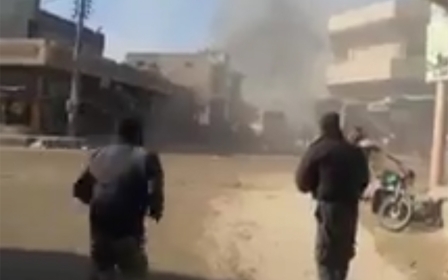Aleppo rebels tell US: We cannot leave our city to mercenaries

Rebels in Aleppo have told the United States they will not leave their besieged enclave in the city after Moscow called for talks with Washington over their withdrawal, signalling they will fight on even as their top commander was wounded.
Speaking to Reuters from Turkey on Sunday, Fastaqim rebel faction official Zakaria Malahifji said groups fighting in Aleppo told US officials on Saturday they would not leave the city.
The US officials had asked the rebels "do you want to leave, do you want to be steadfast," Malahifji said.
"Our response to the Americans was as follows: 'We cannot leave our city, our homes, to the mercenary militias that the regime has mobilised in Aleppo'."
"They listened to the response and did not comment," he said, adding the rebel groups had reiterated calls for humanitarian corridors to be opened for the delivery of food and medicine into eastern Aleppo and the evacuation of the wounded.
In another blow to the rebels, the head of a new rebel alliance was seriously wounded on Saturday, rebel officials said. Abu Abdelrahman Nour will be replaced as head of the "Aleppo army" he was appointed to lead last week.
The US has yet to comment on the proposal made by the Russian foreign minister, Sergei Lavrov, on Saturday for talks on the "complete withdrawal" of all rebel fighters "without exclusion" from Aleppo.
The defiance came as fierce fighting shook east Aleppo on Sunday, with Syrian government forces pressing an assault that has seen them retake control of more than half of the former rebel stronghold.
President Bashar al-Assad's army is nearly three weeks into an operation to recapture all of Syria's second city, divided between regime and rebel forces since 2012.
A Syrian official told the Reuters news agency that the Syrian army would "continue to implement its missions until the elimination of the terrorists and the recovery of control over all the eastern districts".
On Sunday, Russian soldiers were photographed escorting civilians in the Hanono district of the city, which was recently taken over by government forces. Russia has insisted it has not attacked the city since November.
Tens of thousands of civilians have fled the offensive, which has made steady gains and threatens to deal Syria's opposition its worst defeat of the country's five-year civil war.
'They listened to the response and did not comment' - Fastaqim official Zakaria Malahifji
On Sunday, heavy fighting was under way in the Myessar district and elsewhere on the outskirts of newly recaptured districts in the east.
Syrian state television showed what it said was live footage from the front line, with its correspondent crouched by a building as explosions were heard in the distance and jets screeched overhead.
The Syrian army holds more than 60 percent of east Aleppo after seizing the Tariq al-Bab area on Friday night and making additional advances on Saturday, according to the Syrian Observatory for Human Rights group.
"The army now aims to advance and take control of Shaar district and the surrounding districts to force the rebels to withdraw toward the southeastern neighbourhoods," said Observatory director Rami Abdel Rahman.
The army issued a statement overnight urging Syrians from northeastern Aleppo "to return to their homes after the Syrian Arab Army restored security and stability to those districts and state institutions began rehabilitation work".
Exodus of civilians
On Saturday, several hundred people took advantage of the resumption of government buses from west to east to check on homes long abandoned in territory formerly held by rebels.
But the level of destruction in many places meant people were able to do little more than check whether any possessions could be retrieved from ravaged homes.
"This is all we found, this photo of my niece. It is precious to us, and we found a copy of the Koran, so we brought that too," said Um Yayha, 55.
The army began its assault on the east in mid-November, pounding rebel-held neighbourhoods with air strikes, barrel bomb attacks and artillery fire.
The assault has killed at least 311 civilians, including 42 children, according to the Observatory.
Rebel fire on the government-held west of Aleppo has killed 69 civilians, including 28 children, in the same period, the monitor says.
The government advance has prompted an exodus of civilians, with some fleeing south to remaining rebel-held territory and up to 50,000 heading to areas controlled by the government or Kurdish forces.
Russia, a staunch ally of the Syrian government, said Sunday it had delivered 30 trucks of aid to Aleppo.
"It is important for Russia that people do not starve, that the people feel that they are needed both by the Syrian government and by Russia," Russian official Nikolai Ponomaryov told journalists in Aleppo.
East Aleppo has been under government siege since July, with international aid stocks exhausted and remaining food supplies dwindling.
Russia says it is not participating in the offensive in Aleppo, though its forces are continuing to wage the aerial campaign they began in September 2015 elsewhere in the country.
On Sunday the opposition High Negotiations Committee urged the international community to "take immediate action to stop the bombing and massacres targeting several areas in Syria and Aleppo in particular".
Britain's foreign minister, Boris Johnson, meanwhile said government advances in Aleppo were not a "victory for Assad" as many Syrians would continue to reject his rule.
"The best outcome is for President Putin and the puppets that he supports to get to the negotiating table and do a deal that moves Syria away from the Assad regime," he said.
Stay informed with MEE's newsletters
Sign up to get the latest alerts, insights and analysis, starting with Turkey Unpacked
Middle East Eye delivers independent and unrivalled coverage and analysis of the Middle East, North Africa and beyond. To learn more about republishing this content and the associated fees, please fill out this form. More about MEE can be found here.





